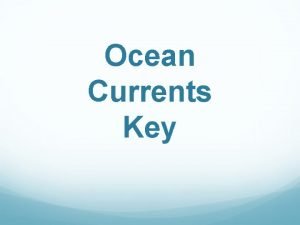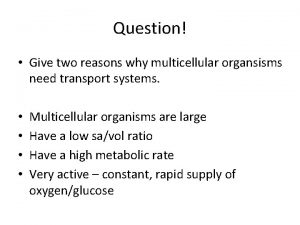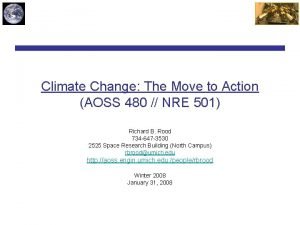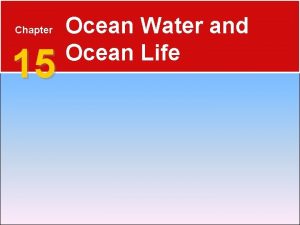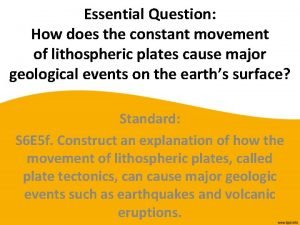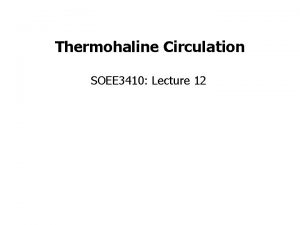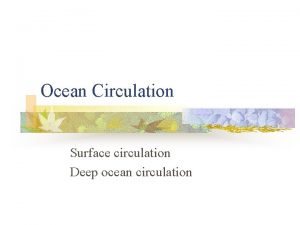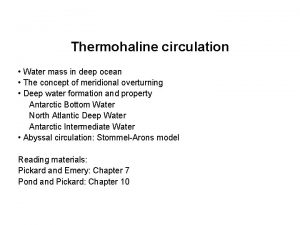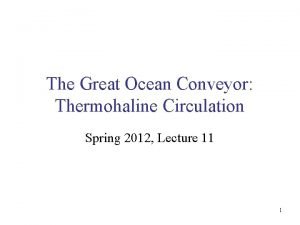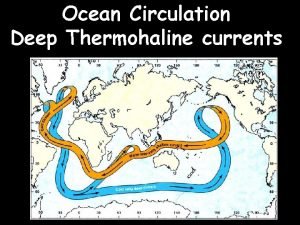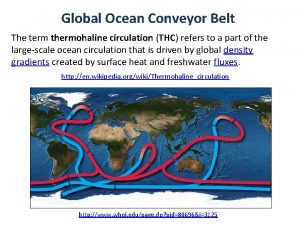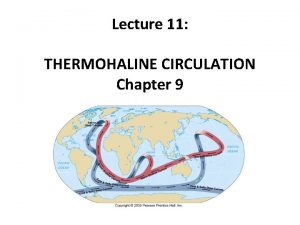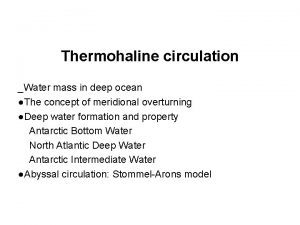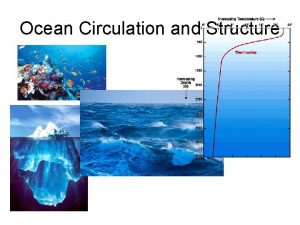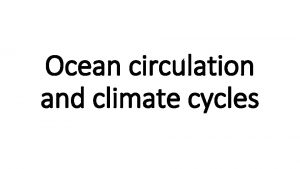Thermohaline Ocean Circulation Stefan Rahmstorf What is Thermohaline


![[Key features] • Deep water formation • Spreading of deep waters : NADW, AABW [Key features] • Deep water formation • Spreading of deep waters : NADW, AABW](https://slidetodoc.com/presentation_image_h2/77c1efa5ca22afad2400ebd0865a647f/image-3.jpg)








- Slides: 11

Thermohaline Ocean Circulation Stefan Rahmstorf

What is Thermohaline Circulation? • Part of the ocean circulation which is driven by fluxes of heat and freshwater. • Distinction of thermohaline vs wind-driven - Ocean’s density distribution pressure gradient (circulation) - Currents and mixing density distribution • MOC is the north-south flow that includes wind-driven parts whereas THC is also associated with zonal overturning cells.
![Key features Deep water formation Spreading of deep waters NADW AABW [Key features] • Deep water formation • Spreading of deep waters : NADW, AABW](https://slidetodoc.com/presentation_image_h2/77c1efa5ca22afad2400ebd0865a647f/image-3.jpg)
[Key features] • Deep water formation • Spreading of deep waters : NADW, AABW • Upwelling of deep waters : ACC region by Ekman pumping • Near-surface currents to close the flow

What Drives the THC? • High-latitude cooling high density sinking of water • Ocean basin would be filled with dense water and the circulation would stop. • It requires a mechanism that continually works to make the water in the box less dense, so that the source water remains denser than the water already in the box. • Sandstrom’s theorem : Heating at greater depth than cooling is required. This enables an ongoing replacement by colder water from above.

In the Real Ocean? • Heating occurs at the surface due to the sun. • The slow diffusion of heat by turbulent mixing caused by tides and the winds.

Nonlinear Behavior of the THC • Tropics, subtropics : warm, saltier low density • High latitudes : cold, fresher high density • Thus, THC is thermally driven. • Freshwater input density difference circulation salinity difference

The Circulation’s Effect on Climate • Large heat transport of up to 1 PW in the North Atlantic. warm by ~5 K sea ice pushed back albedo feedback • THC switched off 1) NH cools / SH warms shifts thermal equator and ITCZ southward 2) sea level around the northern Atlantic rise by up to 1 m

THC in Quaternary Climate Changes • Warm mode : similar to present-day • Cold mode : NADW forming south of Iceland • Switched-off mode : occurred after major input of freshwater • Heinrich events – large input of freshwater by iceberg discharge Stopped NADW formation Proxy data shows cooling around mid-latitude Atlantic • Younger Dryas – meltwater floods • DO events – north-south shifts in convection location Dramatic warm events in Greenland northern Atlantic & Coinciding increase in salinity in the Irminger Sea pushes warm, salty Atlantic waters northward into the Nordic Seas • Glacial conditions – Southward shift of the main deep water formation (Nordic Seas South of Iceland) reduces ocean heat transport to high latitudes and expands sea ice.

The Future of the THC • Global warming : surface warming & surface freshening Both reduce the density of high-latitude surface waters Inhibit deep water formation weakening of NADW formation serious impact on marine ecosystems, sea level and surface climate including a shift in ITCZ • THC collapse : “low probability – high impact” risks associated with global warming


In the Real Ocean? • Heating occurs at the surface due to the sun. • The slow diffusion of heat by turbulent mixing caused by tides and the winds. • Both THC and wind-driven circulation drive the observed MOC in the world oceans. Westerlies over Southern Ocean Divergence of surface currents Upwelling from deep waters due to “Drake Passage Effect” High-latitude North Atlantic with the highest surface densities and stable stratification.
 The wind stirs up _____ currents.
The wind stirs up _____ currents. Single circulation and double circulation
Single circulation and double circulation Alveoli diagram
Alveoli diagram Single vs double circulatory system
Single vs double circulatory system Thermohaline shutdown
Thermohaline shutdown Slowing atlantic ocean circulation
Slowing atlantic ocean circulation Red ocean strategi
Red ocean strategi Divergent vs convergent plates
Divergent vs convergent plates Chapter 15 ocean water and ocean life
Chapter 15 ocean water and ocean life Ocean ocean convergent boundary
Ocean ocean convergent boundary Scrat s continental crack up
Scrat s continental crack up Convergent boundary
Convergent boundary
